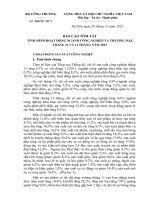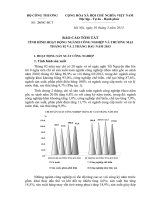BÁO CÁO "THIẾT KẾ MÔ HÌNH TỰ ĐỘNG ĐO NHỊP TIM VÀ NHIỆT ĐỘ CƠ THỂ NGƯỜI " pot
Bạn đang xem bản rút gọn của tài liệu. Xem và tải ngay bản đầy đủ của tài liệu tại đây (277.15 KB, 4 trang )
Tuyển tập Báo cáo Hội nghị Sinh viên Nghiên cứu Khoa học lần thứ 8 Đại học Đà Nẵng năm 2012
1
THIẾT KẾ MÔ HÌNH TỰ ĐỘNG ĐO NHỊP TIM
VÀ NHIỆT ĐỘ CƠ THỂ NGƯỜI
DESIGNING HEART RATE AND TEMPERATURE MONITORING
EQUIPMENT MODEL
SVTH: Nguyễn Bá Tòng, Nguyễn Đặng Quốc Anh, Nguyễn Duy Hiển
Lớp 07ECE, Chương Trình Tiên Tiến, Trung Tâm Xuất Sắc, Trường Đại học Bách Khoa, ĐHĐN
GVHD: KS. Nguyễn Thế Nghĩa
Trung Tâm Xuất Sắc, Trường Đại học Bách Khoa, Đại học Đà Nẵng
TÓM TẮT
Đồ án này tạo ra một thiết bị sử dụng công nghệ truyền dẫn thông tin và mạng nội bộ để
đưa ra một giải pháp thuận tiện nhằm quản lí sức khỏe con người. Thông tin sức khỏe đo được từ
thiết bị sẽ được truyền dẫn qua dây cáp mạng đến một máy chủ; và từ đó có thể được truy cập
thông qua trình duyệt web. Đồ án này cung cấp một giải pháp quản lí sức khỏe con người với giá
cả hợp lí, tiện dụng nhằm thu hẹp khoảng cách giữa bệnh nhân và bác sĩ.
ABSTRACT
This project creates a portable device implementing wire-lined technology and taking full
advantage of the local area network (LAN) to provide a convenient solution to monitor human
health. The health information acquired on the portable side transmits to the server and can be
accessed all over the Internet in real-time. Eventually, this project provides a low-price, easy-
access human health monitor solution bridging the gaps between patients and doctors.
1. Introduction
The importance of this project is that we implemented a cheap, portable and easy to
use health monitor system. This has special meaning for patients because they can check
their heart rate as well as temperature all the time. The device is affordable by almost every
patient. This final project is successful with most of the objectives and extended goals in
the proposal achieved.
All information of heart rate and body surface temperature are measured accurately
and automatically. The hardware and software is workable for almost everyone. MCU can
communicate with server via bi-directional RJ45 cable communication. The webserver is
connected with the browser and can be accessible by UART.
In the extent of this project, we will introduce its methods and applications to
examine human health by measuring the heart rate and the temperature.
2. Design Specifications
2.1. System Inputs
The display and measurement component of the system in the first prototype must
track and support the measurement and display of the following signals:
Measurements:
Blood Pressure (via Power Supply Machine).
Body temperature (via Power Supply Machine).
Pulse rate (via Waveform Generator).
EKG (via Waveform Generator).
Keypad:
Tuyển tập Báo cáo Hội nghị Sinh viên Nghiên cứu Khoa học lần thứ 8 Đại học Đà Nẵng năm 2012
2
Measurement Selection (by Kit’s button).
Scroll (by Kit’s button).
Select (by Kit’s button).
Alarm Acknowledge (by Kit’s button).
2.2. System Outputs
The display component of the system must track and support the display of the
following signals:
Blood Pressure (in OLED, HyperTerminal screen, Ethernet screen).
Body temperature (in OLED, HyperTerminal screen, Ethernet screen).
Pulse rate (in OLED screen, HyperTerminal screen, Ethernet screen).
EKG (in OLED screen, HyperTerminal screen, Ethernet screen).
The status, alarm, and warning management portion of the system must monitor
and annunciate the following signals:
Status (in OLED screen).
Battery state (in OLED screen, HyperTerminal screen).
Alarms (flashing LED and buzzer).
Temperature, blood pressure, or pulse rate too high (in OLED screen,
Ethernet screen).
Temperature, blood pressure, or pulse rate out of range (in OLED screen,
Ethernet screen).
3. Functional Decomposition
The system is decomposed into the major functional blocks: Schedule, Startup,
Keypad, Measure, Compute, Status, Warning, Display, Serial Communication, Remote
Command and Control, EKG Measurement, EKG Processing.
4. Task Definition
Measurement: during task execution, only the measurements selected by the user
are to be performed.
Compute: the data from measure would be calculated with selected range mode to
pan out corrected value.
Display: after correcting value, the value would be send out an LCD, support two
modes: Menu and Annunciation.
Status: the battery status is checked.
Warning/Alarm: the evaluation status of input signal. Warning if it was out of
specified range.
Schedule: cause the suspension of all task activity, except for the operation of the
warning and error annunciation, for five seconds.
Startup: perform any necessary system initialization, configure and activate the
system time base, then suspend itself.
Keypad: used to support the user entering information as well as acknowledging
alarm signals associated with the current design and in future enhancements to the
system.
Serial Communications: format the data to be displayed and send that data to the
serial port for display on Hyperterm
TM
.
Communications Support: The system is to provide data to and receive commands
from a remote computer via a local area network connection.
Tuyển tập Báo cáo Hội nghị Sinh viên Nghiên cứu Khoa học lần thứ 8 Đại học Đà Nẵng năm 2012
3
Remote Command and Control: The system must support the display of
measurement data and warning and alarm information on and accept commands
from a remote computer.
Command Management: The task will receive and interpret commands from the
Remote Communications task then direct the local subsystem(s) to perform the
requested tasks. It will format any requested data to be sent by the Remote
Communications task over the network to the remote system.
EKG Measurement: The system must provide the ability to make EKG
measurements on the patient. Eventually, the design must support 12 lead
capabilities; however, for this prototype, a single channel will suffice to prove the
ability to make such time critical measurements. To that end, the system must
collect a set of isochronously spaced samples of a sinusoidal analogue input signal,
convert them to digital form, and store the samples for further processing, then
signal when the collection is complete.
EKG Processing: The system must convert the sampled data from the time domain
to the frequency domain, and then send the component frequency values to each of
the display channels.
5. Test Plan
We will test in order of tasks: Startup, Keypad, Measure, Compute, Status,
Warning, Display, Serial Communication, Communications Support, Remote Command
and Control, Command Management, EKG Measurement, EKG Processing, Safety. After
the startup state shows up and works correctly; a state of the measuring and analyzing
system is to be designed and developed. The sensors and measurement subsystem will be
used to access and then to measure a variety of temporal phenomenon. The data then is
displayed correctly on OLED screen, Hyperterminal screen and Webpage screen. The
display and annunciation subsystems shall display the measured results and signal a
warning if the measured data falls outside of pre-specified bounds. The keypad state works
in association with the display state.
6. Test Specifications
The final designed system must be capable of collecting data from several different
types of sensors, processing the corrected data from those sensors, displaying them locally,
and then transmitting it over serial communications to a collection management station.
Measurement: only measurements selected by user are to be precisely performed.
Compute: calculate data with selected range mode to produce precise value
Display: the value would be displayed correctly on OLED screen. No wrong number
or letters allowed. Pay attention on space enough to display sufficient information.
Warning/Alarm: Warning if measured data was out of specified allowable range and
flash the LED, generate buzzer with different period of time.
Schedule: check the operation of tasks executed, for five-second period.
Startup: perform any necessary system initialization, configure and activate the
system time base, timers, OLED, ADC and PWM, then suspend itself.
Keypad: enter information as well as acknowledge alarm signals associated with the
current design. It must work smoothly and correctly.
Serial Communications: format the data to be displayed and send that data to the
serial port for display on Hyperterm
TM
.
Tuyển tập Báo cáo Hội nghị Sinh viên Nghiên cứu Khoa học lần thứ 8 Đại học Đà Nẵng năm 2012
4
Communications Support: The system is to provide data to and receive commands
from a remote computer via a local area network connection.
Remote Command and Control: The system must support the display of
measurement data and warning and alarm information on and accept commands
from a remote computer.
Command Management: The task will receive and interpret commands from the
Remote Communications task to perform the requested tasks.
EKG Measurement: the system must collect samples of a sinusoidal analogue input
signal, convert them to digital form, and store the samples for further processing,
then signal when the collection is complete. Sampling frequency (collecting-data
frequency) must be greater than twice of the signal frequency (Fs > 2*Fn).
EKG Processing: The system converts the sampled data from time domain to
frequency domain, and then sends the component frequency values to each of the
display channels. It must collect data correctly and perform the FFT method.
7. Conclusions
Our design was basically built successfully. The design and code matched with the
given design specifications. However, there were still some mistakes and we think
they will be soon improved.
In the near future, we are going to solve the existing problems in our project. Then,
we may apply the wireless communication, GPS in our product. We can know exactly the
location of the patient as well as send information, warnings to them when emergency
cases happen. Moreover, we can store the data in MicroSD Card attached in our Stellaris
KIT which helps us review our health data anytime, anywhere. We will make it become a
completely perfect product.
TÀI LIỆU THAM KHẢO
[1]
[2]
[3]
[4]
[5]









